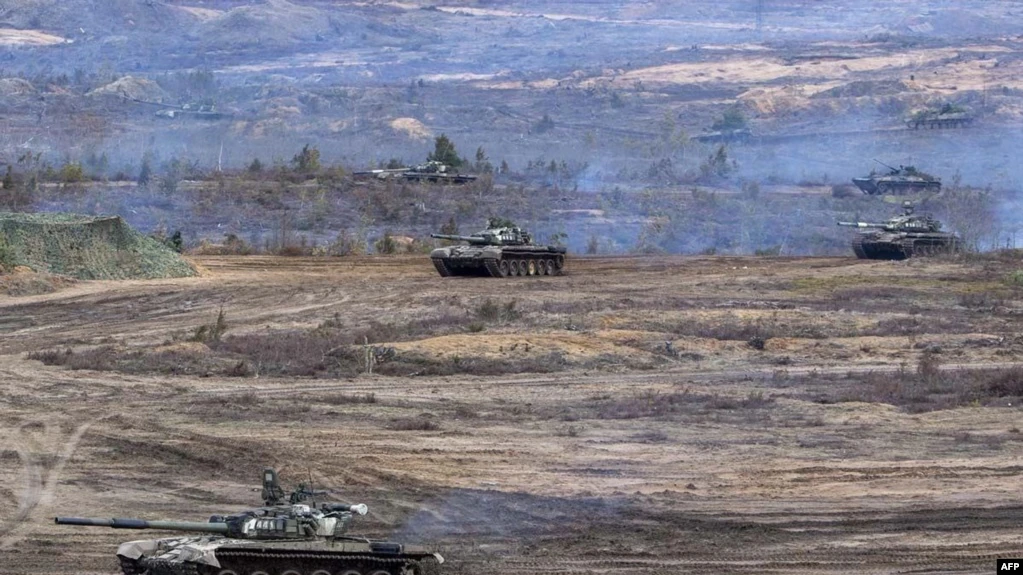
WASHINGTON/VILNIUS — Exiled Belarusian sources say recent Russian military activities inside Belarus, a key Moscow ally, show Russia is trying to maintain a threat of attack from Belarus against northern Ukraine after failing in a land-based assault on the region housing Ukraine’s capital Kyiv earlier this year.
While the Belarusian journalists, analysts and dissidents say another Russian invasion of northern Ukraine from Belarus does not appear imminent, that prospect has sparked a debate among them about whether the forces of Belarusian President Alexander Lukashenko would join such a Russian offensive.
Belarus-based Russian forces pushed into northern Ukraine at the start of Russia’s full-scale invasion of the country in late February in a bid to capture Kyiv, a 150-kilometer drive from the Belarusian border.
Lukashenko kept his forces out of direct involvement in the invasion, while publicly supporting it and allowing Russia’s military to use Belarusian territory and infrastructure. Ukrainian forces supplied with Western weapons stopped the Russian assault outside Kyiv and counterattacked, prompting a Russian withdrawal from northern Ukrainian areas around Kyiv and a retreat into Belarus by early April. Russia had deployed tens of thousands of troops in Belarus by the start of its all-out war on Ukraine. Now, the Russian troop presence in Belarus is in the hundreds, according to Franak Viacorka, a senior adviser to exiled Belarusian opposition leader Sviatlana Tsikhanouskaya.
“There are only up to 1,000 Russian troops, but a lot of Russian military equipment remains,” Viacorka told VOA in a July 21 interview from the Latvian capital, Riga. “If the Russians decide to come back to Belarus [in greater numbers] to attack Ukraine from Belarus territory, it’s still possible,” he said.
Lithuania-based independent Belarusian foreign policy analyst Katsiaryna Shmatsina, who has worked for several U.S. and European research organizations, told VOA by phone that Russia would have two main goals in any new assault on northern Ukraine via Belarus.
“Russia would be interested to block or undermine the shipment of Western military aid through northern Ukraine, and also to distract attention” from eastern and southern Ukraine, where the nation’s forces are concentrated against the main Russian offensive, Shmatsina said.
A news outlet called the Belarusian Hajun project, founded by Lithuania-based exiled Belarusian dissident Anton Motolko, has been posting reports on Telegram and Twitter of almost daily sightings of Russian military movements in Belarus in recent weeks.
Those reports by citizen journalists inside the country, some with photographs, include apparent sightings of Russian troops and military vehicles on roads and Russian military planes landing at and taking off from Belarusian airfields. Those citizen journalists also have reported seeing Russian Iskander-M mobile short range ballistic missile units and Russian S-400 mobile surface-to-air missile units at an airfield in the Gomel district of southeastern Belarus.
Ukrainian officials said Russia fired missiles from Belarus at the nearby Chernihiv district of Ukraine on Thursday. The Belarusian Hajun project tweeted what is said were photos of the Russian missiles being launched from a Belarusian airfield in Gomel.
Shmatsina said Motolko’s news outlet is the main Belarusian source of information on those Russian activities, although she said the accuracy of citizen journalist reports is unclear.
Open-source intelligence assessments from this month concluded that Belarus still is granting Russia access to its airspace. Those assessments pointed to Ukrainian intelligence sources that found Belarus likely transferred the use of its Pribytki airfield in Gomel to Russia.
Viacorka said most of the Russian forces in Belarus are maintaining equipment, collecting intelligence and communicating with Belarusian officials and military personnel. “But these are not troops that usually are used for [land-based] operations in a war,” he said.
In a Thursday tweet, the Belarusian Hajun project said it does not see Russian forces in Belarus having the right conditions for another invasion of northern Ukraine in the near future.
Some exiled Belarusian commentators see a longer-term threat of a Russian reinvasion and a potential for Belarusian military forces to join such an assault on Ukraine for the first time.
sightings of Russian military activities inside Belarus.

In a July 12 audio program produced by VOA sister network RFE/RL’s Russian Service, Belarusian political scientist Pavel Usov said the latest concentrations of Russian military equipment and personnel in Belarus indicate a “rather high probability that the northern front [of Russia’s war on Ukraine] will be opened again.”
Usov, head of the Centre for Analysis and Political Forecast in Warsaw, said mutual defense agreements between Belarus and Russia, which exercises strong military and economic influence over its smaller neighbor, create “prerequisites” for the direct involvement of Lukashenko’s armed forces in the Ukraine war.
Speaking to the same July 12 RFE/RL audio program, Belarusian journalist Natalya Radina also said the Belarusian military’s participation in another Russian assault on Ukraine is possible, citing recent statements by Lukashenko and his deputy chief of the general staff Ruslan Kosygin.
In a July 2 speech reported by Belarusian state news agency BelTA, Lukashenko said his armed forces “will fight” if “the enemy” invades Belarusian territory, without naming any nation. Four days later, BelTA cited Kosygin as saying Belarus’ response to “any kind of armed provocation will definitely be adequate and tough.”
“Of course, [Lukashenko] wants to participate in this [Ukraine war],” said Radina, a Warsaw-based chief editor for the Charter-97 news outlet.
“Even more aggressive statements are heard from his side than from the lips of [Russian President Vladimir] Putin … It is clear that politically and economically he is absolutely dependent on Putin, but he himself enjoys his participation in this monstrous war,” she said.
Other Belarusian commentators were skeptical that either Lukashenko or Putin would want Belarusian forces to join a Russian reinvasion of northern Ukraine.
Shmatsina said many Belarusian soldiers lack experience in offensive operations and there is little public support for them fighting against Ukraine. She also noted that Lukashenko has faced a domestic legitimacy crisis since declaring himself the winner of a sixth presidential term in a disputed 2020 election that the opposition, the United States and European Union allege was rigged and that triggered weeks of public anti-Lukashenko protests.
“If we see Belarusian deaths in Ukraine, coffins returning home, this would create even more instability in Belarus. Would the Russians want this additional instability at their border?” Shmatsina said. “Belarusian infrastructure seems to be much more useful for the Russian military in Belarus [than Belarusian personnel],” she added.
Viacorka said it is possible that some Belarusian military officers would desert and resist orders to join Russia in fighting Ukraine. He also said Russia may again prepare an invasion of northern Ukraine without involving Belarusian officers, in which case he said those officers “would not even know about it.”
Latvian military analyst Igors Rajevs, a reserve colonel of the Latvian Land Forces, said in an interview with VOA’s Russian Service that he also sees no motivation for Russia or Belarus to change their posture regarding involvement in the war against Ukraine. The most likely scenario is for them to maintain the status quo, he said.
National Security correspondent Jeff Seldin contributed to this report from Washington and VOA Russian stringer Anna Plotnikova contributed from Vilnius.
NewLatter Application For Free
































